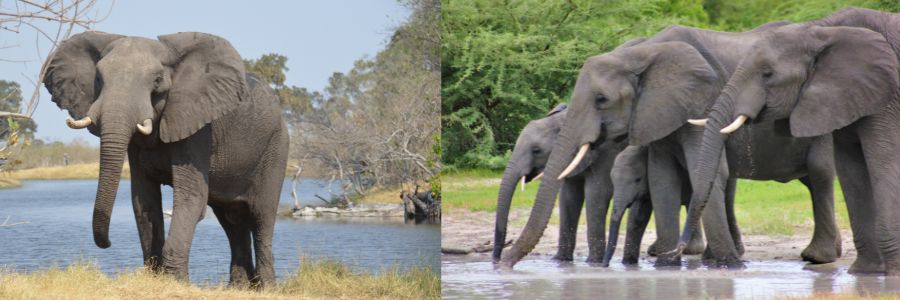How Long Does An Elephant Live? Despite being the largest land animals on the planet, elephants have a remarkable lifespan that is surpassed by only humans. In their natural habitat:
- African elephants can live up to 70 years, while
- Asian elephants can live up to 48 years.
However, due to human interference and the endangerment of their species, elephants’ lifespans have been significantly reduced both in the wild and captivity. Recent scientific studies indicate that African elephants now have an expected lifespan of around 56 years, while Asian elephants live around 41.7 years. This decline in life expectancy raises concerns about the threats that these magnificent creatures face in their environments. In this article, we will delve deeper into the reasons behind the decreasing lifespan of elephants and explore the challenges that must be addressed to protect their future survival.
Contents
How Long Does an African Elephant Live
African elephants can live up to 70 years.
African elephants are one of the longest-living land mammals on earth, with a lifespan that can exceed 70 years in the wild. However, the actual lifespan of an African elephant depends on various factors such as its environment, genetics, and the impact of human activities. Unfortunately, poaching, habitat loss, and other threats have significantly impacted the survival rates of African elephants, with many living shorter lives than they would under natural conditions. In recent years, conservation efforts have focused on protecting these majestic animals and ensuring their longevity. With proper protection and conservation efforts, African elephants can continue to live long and healthy lives in their natural habitats.
Why wild elephant lifespans are shortening
There are several factors that have contributed to the shortening of wild elephant lifespans. These include:
- Habitat loss: As human populations continue to expand, natural habitats are being destroyed at an alarming rate, which leads to a decrease in food and water sources for elephants. This can cause stress and malnourishment, which can lead to a shorter lifespan.
- Poaching: The illegal ivory trade has led to the poaching of elephants for their tusks, which has resulted in a significant decline in elephant populations in many regions. Poaching also disrupts social structures within elephant herds, leading to increased stress and lower survival rates.
- Human-elephant conflict: Elephants and humans often come into conflict over resources such as land and crops, leading to incidents of elephants being killed or injured.
- Climate change: Changes in climate patterns and extreme weather events can also have a negative impact on elephant populations by disrupting their food and water sources.
- Disease: Elephants can be susceptible to various diseases, which can spread quickly within herds and cause a high number of deaths.
All of these factors are contributing to the shortening of wild elephant lifespans. Conservation efforts focused on protecting habitats, ending poaching, managing human-elephant conflict, and addressing the impacts of climate change are essential to ensure the continued survival of these magnificent animals.
How Can We Protect Elephants
There are several ways that we can protect elephants:
Stop poaching
Poaching is one of the biggest threats to elephants, and it is important to stop the illegal killing of elephants for their ivory tusks and other body parts. This can be done through strict law enforcement and penalties for poachers.
Protect habitat
Elephants require large areas of land to roam and find food, so it is important to protect their natural habitats. This can be done by setting up protected areas and wildlife corridors, and by reducing human encroachment on their habitats.
Reduce human-elephant conflict
As human populations grow, there is increased competition for resources, which can lead to conflict between humans and elephants. This can be reduced by implementing measures such as electric fences, warning systems, and compensation for farmers who experience crop damage from elephants.
Promote responsible tourism
Tourism can provide important economic benefits to communities, but it must be done responsibly to avoid disturbing elephants or their habitats. Tourists should be encouraged to support ethical and responsible elephant experiences, such as viewing elephants in the wild or visiting reputable elephant sanctuaries.
Support conservation organizations
There are many organizations working to protect elephants and their habitats. Supporting these organizations through donations or volunteering can help to protect these magnificent animals.
FAQs
How long do elephants live in captivity?
In captivity, elephants can live anywhere from 40 to 70 years, depending on factors such as the quality of care they receive, their living conditions, and their access to veterinary care.
The lifespan of captive elephants can be shorter than that of wild elephants due to a number of reasons such as lack of exercise, inadequate nutrition, and chronic stress. However, some elephants in captivity have been known to live longer than their wild counterparts due to better healthcare and nutrition.
It’s important to note that elephants are highly social animals and thrive in the company of other elephants. Solitary confinement or isolation can lead to psychological distress and other health problems, which can impact their lifespan. Therefore, it is crucial to provide captive elephants with appropriate socialization opportunities and companionship from other elephants.
What is the average lifespan of elephant?
The average lifespan of an elephant varies depending on the species and other factors such as habitat, food availability, and environmental conditions.
African elephants have an average lifespan of around 60 to 70 years in the wild, while Asian elephants have an average lifespan of around 60 years. However, elephants in captivity tend to have shorter lifespans than their wild counterparts due to a variety of factors, including inadequate care, lack of exercise, and social isolation.
It’s important to note that these are average lifespans, and individual elephants may live longer or shorter depending on their circumstances. Additionally, with conservation efforts and improved management of protected areas, wild elephants may have the potential to live longer.
